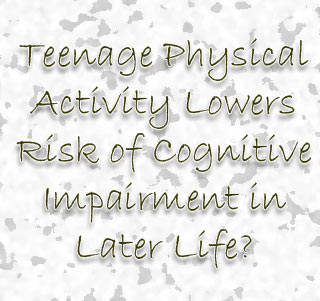
Physically active individuals lower their risk of dementia and other minor forms of cognitive impairment in old age. However there is limited understanding of activeness during early stages in life and at various other ages. Experts compared physical activities at 30 and 50 years. They further observed late life against cognition of 9,344 women from Maryland, Minnesota, Oregon and Pennsylvania to identify the efficiency of activity at different life stages.
Laura Middleton, PhD, of Sunnybrook Health Sciences Centre, Canada shares, “Our study shows that women who are regularly physically active at any age have lower risk of cognitive impairment than those who are inactive but that being physically active at teenage is most important in preventing cognitive impairmentâ€.
Including overall participants enlisted for the study 15.5%, 29.7%, 28.1% and 21.1% reported being physically inactive at teenage, at 30 years, 50 years and later on in life respectively. Augmentation in cognitive impairment for those who were inactive was between 50% and 100% at each time point. Physical activity for all four ages was entered into a single model. They were adjusted for variables namely age, education, marital status, diabetes, hypertension, depressive symptoms, smoking, and BMI. Experts observed that teenage physical activity status remained notably connected with cognitive performance in old age.
Women reduced their risk of cognitive impairment even if they were physically inactive during teenage but became physical activity at the age of 30 and 50 years as compared to those who remained inactive throughout. However being physically active at age 30 and age 50 was not considerably related with rates of cognitive impairment among women already physically active during teenage.
Middleton shares, “As a result, to minimize the risk of dementia, physical activity should be encouraged from early life. Not to be without hope, people who were inactive at teenage can reduce their risk of cognitive impairment by becoming active in later life.â€
She further quotes, “Low physical activity levels in today’s youth may mean increased dementia rates in the future. Dementia prevention programs and other health promotion programs encouraging physical activity should target people starting at very young ages, not just in mid- and late lifeâ€.
In conclusion scientists share that mechanisms related to physical activity throughout life associated with late life cognition are likely to be multi-factorial. This highlights that physical activity has a positive impact on brain plasticity and cognition. In addition physical activity lowers rates and severity of vascular risk factors. These factors include hypertension, obesity, and type II diabetes usually linked with increased risk of cognitive impairment.
These findings were published in the Journal of the American Geriatrics Society.
